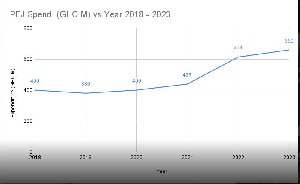Minority MPs estimate that since Planting for Food and Jobs (PFJ) was launched in 2017, the government has spent a total of GH2.9 billion on the program.
According to a breakdown of program spending, the government invested GH400 million in 2018, GH380 million in 2019, and GH400 million or so in 2020. In addition, the program received GH 439 million in 2021, GH 614 million in 2022, and GH 660 million in 2023.
The sector’s growth rate has regrettably stayed low at around 0.7 percent, they claimed, despite the enormous sums spent, as the nation struggles with soaring food inflation not seen in decades.
“Having inherited an agricultural sector with a growth rate of 2.7 percent in 2016, and after expending millions of cedis on PFJ for six years, agriculture growth currently stands at a disastrous 0.7 percent,” the deputy Ranking Member, Committee on Food, Agriculture and Cocoa Affairs, Dr. Godfred Seidu Jasaw, said in a press statement.
PFJ, initiated in 2017, had the ambitious goal of modernizing agriculture, enhancing production, and ensuring food security and profitability for farmers. The program’s initial phase focused on crops, aiming to bolster food security, ensure the immediate availability of select food crops in the market, and create job opportunities.
However, it is worth noting that headline inflation surged to a staggering 54.1 percent in December 2022, and it presently stands at 43.1 percent. Against this backdrop, the program has been deemed a significant failure, yielding minimal positive outcomes.
The minority expressed apprehensions regarding the allocation of GH¢660 million to PFJ in 2023, despite the government’s announcement that the program’s first phase concluded in December 2022. Consequently, the statement called for transparency and demanded clarification regarding the purpose of the 2023 allocation.
Furthermore, it’s noteworthy that President Nana Akufo-Addo recently launched the second phase of PFJ, signaling a shift in policy direction from input subsidies, as observed in the first phase, to an input credit guarantee system.
“Why has government failed to support food-crop farmers in Ghana since January 2023? Private agro-dealers and aggregators have been implementing various forms of input credit support schemes to farmers for many years now; what exactly will this new PFJ input credit do differently?
“We still cannot account for the so-called increased production figures that were being churned out by the Minister for Agriculture. Where is the maize? Where is the rice? Where are the soybeans? One would have reasonably expected to have a food glut in Ghana by now, which would have driven down prices,” he stated.
The statement highlighted several recognized limitations within the program’s initial phase. These include imposing a significant budgetary burden on the government, adopting the value chain approach, limited accessibility to agricultural credit, low prioritization of the national strategic stock, and insufficient attention to the specific requirements of commercial small, medium, and large-scale farmers.
Furthermore, as per the minority member’s assertion, the government rebranded PFJ from its original concept, which was initially introduced during the tenure of former President Mahama and the NDC administration. The original initiative, known as the ‘Modernisation of Agricultural Productivity to the Local Economy’ (MAPLE), was intended to receive funding from the Canadian government, with a budget allocation of C$125 million, equivalent to US$120 million.
Dr. Seidu Jasaw maintained that upon a thorough examination of the PFJ Phase 2 program document, it became apparent that there were no substantially new elements incorporated, and it is unlikely to make a significant contribution to enhancing the country’s food security.
“We contend that the objective of this new scheme is to erase the mess from the programme’s failed first phase, and create a face-saving platform to continue the dissipation of our scarce resources through establishments by ‘this family and friends’ government,” the statement captured.
The government was also questioned about how it would safeguard smallholder farmers from the profit-driven practices and market risks that input dealers engage in, as well as how it would achieve import substitution for essential goods like rice, maize, and poultry since there are no policies in place to lower input/production costs.
Dr. Seidu Jasaw pointed out that the economy is unable to finance an input subsidy scheme under the IMF program.


